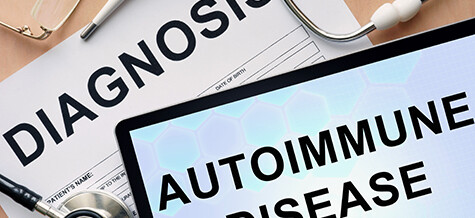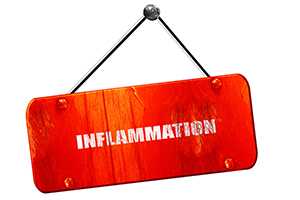
Did you know that 80% of people with autoimmune disorders are female? Did you know that digestive issues, headaches, low energy and even eczema can be early signs of an autoimmune disorder? What’s that, you say?
According to Dr. Robin Berzin, an autoimmune disease is “when the immune system, which is supposed to attack outside invaders, starts attacking the cells in your body.” She also notes that autoimmune disorders are on the rise at an “alarming rate.”
Some of these disorders you may have heard of include:
- Addison’s Disease – an adrenal hormone insufficiency
- Alopecia Areata – a disorder that causes sudden hair loss after starting with one or more circular bald patches that may overlap
- Inflammatory Bowel diseases – a group of inflammatory diseases of the colon and small intestine
- Celiac – an immune reaction to eating gluten, a protein found in wheat, barley and rye
- Crohn’s Disease and Colitis – a result of significantly inflamed digestive tracts
- Grave’s Disease – an autoimmune disease of the thyroid gland that results in the overproduction of thyroid hormone. This disease causes such symptoms as nervousness, heat intolerance, heart palpitations, and unexplained weight loss
- Hashimoto’s Disease – affects the thyroid, causing fatigue, depression and weight gain
- Lupus – an inflammatory disease caused by the immune system attacking its own tissues
- Multiple Sclerosis– a disease in which the immune system eats away the protective covering of nerves
- Psoriasis– a skin condition that causes redness and irritation as well as thick, flaky, silver-white patches
- Polymyalgia Rheumatica – an inflammatory disorder causing stiffness in the shoulders and hips
- Rheumatoid Arthritis – a chronic inflammatory disorder affecting many joints, especially in the hands and feet
- Sjogren’s Syndrome – an immune system disorder with symptoms of dry eyes and mouth
- Type 1 Diabetes – an inflammatory arthritis affecting the spine and large joints
Remember my last post on how important gut health is to the immune system? Click here.

Busy, stressed moms are the largest group diagnosed with autoimmune disorders.
Some other facts about Autoimmune Disorders
- While they are nearly as common as cancer and heart disease they aren’t talked about as much
- They affect 23.5 million Americans
- They primarily affect women of childbearing ages
- Many autoimmune diseases don’t restrict themselves to one part of the body. For example, Systemic lupus can affect the skin, joints, kidneys, heart, nerves, blood vessels, and more. Type 1 diabetes can affect your glands, eyes, kidneys, muscles, and more.
What’s Causing the Immune System to Attack Itself?
According to Dr. Berzin, there are 5 main theories:
- Hygiene Theory – We’re creating overly clean environments.
- Microbiome Theory – With the overuse of antibiotics and over the counter medications, along with eating processed food, we are destroying the healthy bacteria in our guts.
-

Getting 10 minutes of “Sunshine” Vitamin D on your face and hands is healthy!
Leaky Gut Syndrome – When the intestinal tract is damaged, nutrients can leak out and suddenly the immune system is getting turned on or becomes sensitive to new things that it wasn’t before.
- Vitamin D deficiency – There seems to be a strong link between Vitamin D deficiencies and autoimmune disorders.
- Vitamin D deficiency is linked to 18 different kinds of cancer
- Andrew Weil recommends 2,000 IU per day and there are no known risks of taking up to 10,000 IU per day. If you suspect you have a deficiency, check with your doctor.
- Vitamin D is also the sunshine vitamin so be sure to get outside for at least 10 minutes per day, exposing your face and hands especially! To review my post on Vitamin D, click here.
- Elevated cortisol – This stress hormone plays a pretty significant role in the development of these diseases.
It’s easy to see why women of childbearing ages may be the biggest victims in that they often have the busiest lives and put themselves at the bottom of the list when it comes to their own health needs.
Can I Prevent an Early-onset Autoimmune Disorder?
YES! Here are a few things you can do without medication!
- Meditate or find something to de-stress you every day!
- Remove inflammatory foods from your diet, i.e. gluten, white sugar and dairy
- Make sure you’re getting a good probiotic to help enhance good bacteria in the gut
If you have digestive issues, I highly recommend finding a good nutritionist in your area. If you live in the Denver area, I’d look up Maureen West. Here’s more info on her and her guest blog post from last year. Click here.

Inflammation is related to EVERYTHING!
Diet is so important here in reducing inflammation. Inflammation is outside and inside the body-heat, pain, swelling and redness. EVERYTHING is related to inflammation: It can cause allergies, headaches, skin conditions, cancer….etc!
According to Barbara Mendez, an integrative nutritionist, if you have a digestive order you’ve got internal inflammation going on.
Alternative therapies such as acupuncture and Reiki have also shown to be very beneficial in reducing symptoms and as a preventive measure. For more information on these therapies, click here (acupuncture) and here (Reiki).

Let’s live Autoimmune Disorder-free!
Autoimmune disorders are on the rise and we need to get the word out. Early symptoms can lead to bigger problems or full-blown diseases. If you have a loved one who is suffering or you suspect something isn’t “quite right” with how you’re feeling, especially in the digestive tract, listen to your gut (no pun intended) and go see someone in the medical community. I highly recommend finding a holistic or integrative doctor or a good nutritionist where you live. Let’s get these numbers down and be healthy!
Peace and Good Health!
![]()
Sources:
Dr. Robin Berzin-Founder Parsley Health
Healthline
Dr. Andrew Weil
Erin Magner-Well+Good
If you “Like” this post, I’d be thrilled if you’d share it.
OCT
